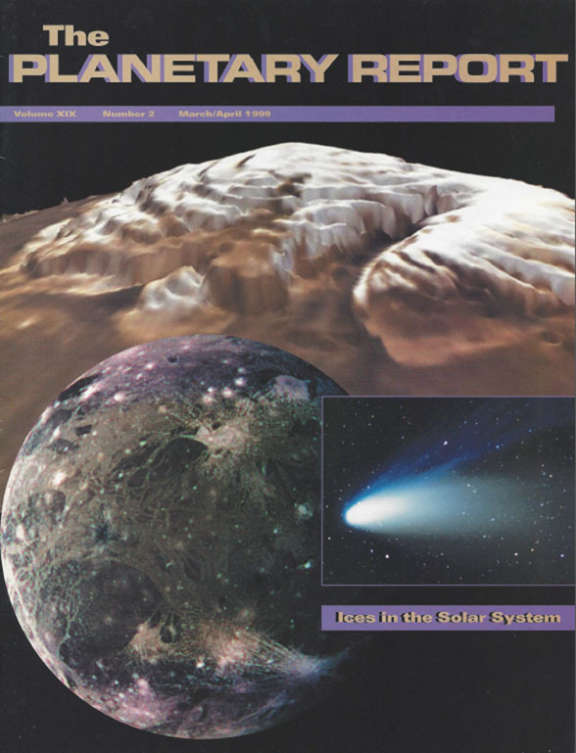The Planetary Report • March/April 1999
Ices in the Solar System
On the Cover: Not all ice is water. Not all water is on Earth. These are the first insights to come from studying the various ices in our solar system. Comets, such as Hale-Bopp (inset), are made primarily of water ice, but frozen carbon dioxide often makes up a substantial part of a comet nucleus. The Martian north polar cap (3D background image, exaggerated vertically to show detail) is primarily frozen water, but the southern cap on Mars is mostly frozen carbon dioxide. The largest of Jupiter's moons, Ganymede (full disk), is bigger than the planet Mercury. Still, in composition, it is roughly half water ice, making it truly a giant snowball in space.
Features
4 Grand Challenges for Space Exploration: It's not often that a government official gets to lay out a vision for the future that goes beyond the next election cycle. But Wes Huntress, who recently stepped down as NASA's Associate Administrator for Space Science, did just that in a speech accepting the Carl Sagan Medal of the American Astronomical Society. Wes' text was far-ranging and detailed, and we had space in the printed magazine for only highlights of his talk.
8 "Ices" in the Solar System: A Tour of Condensible Species: Wendy Calvin of the USGS takes us on a tour through a garden of alien ices throughout the solar system, which consist of far more than just frozen water.
14 Building Toward Mars: A Vision for the Future: Charles Elachi and Louis Friedman summarize the findings of NASA's Mars Architecture group, studying and suggesting ways to get the most out of robotic exploration.
Departments
3 Member's Dialogue Space: Getting from there to here; ice on the Moon.
19 News & Reviews Nomenclature junkets; Pluto's taxonomy.
20 Q&A What are the fastest moving objects in the solar system?
22 Society News Mars Microphone, Planetfest '99, LEGO Mars rovers, and Optical SETI.
The Planetary Report • March/April 1999
Help advance space science and exploration! Become a member of The Planetary Society and you'll receive the full PDF and print versions of The Planetary Report.


 Explore Worlds
Explore Worlds Find Life
Find Life Defend Earth
Defend Earth


